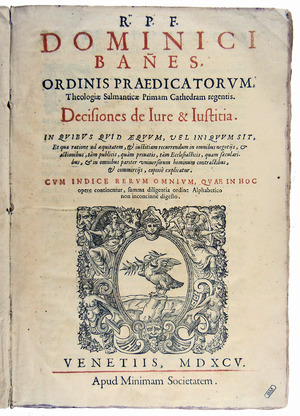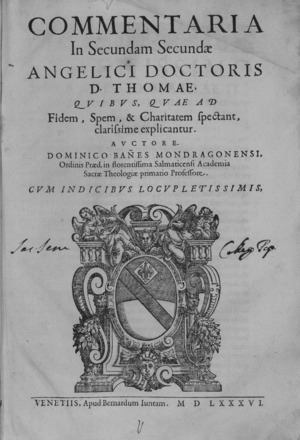Domingo Báñez facts for kids
Domingo Báñez (also known as Dominico Bannes Mondragonensis) was an important Spanish Dominican priest and Scholastic thinker. He was born on February 29, 1528, in Valladolid, Spain. He passed away on October 22, 1604, in Medina del Campo. The name "Mondragonensis" sometimes added to his name likely comes from his father's birthplace in Mondragón.
Contents
Life and Learning Journey
Early Studies and Teaching Career
Domingo Báñez began his studies at the University of Salamanca when he was fifteen. He focused on philosophy. Three years later, he joined the Dominican Order at the Convent of St. Stephen in Salamanca. He officially became a Dominican on May 3, 1547.
He studied theology under famous professors like Melchior Cano. These studies helped him become a very skilled theologian. He became known for understanding and defending the ideas of St. Thomas Aquinas.
Báñez then started teaching. For ten years, he held various teaching roles. He taught younger students about the Summa, a major work by St. Thomas Aquinas. He also filled in for sick professors at the university. He was very successful in these roles.
Teaching at Universities
From 1561 to 1566, Báñez taught at the Dominican University of Avila. Around 1567, he moved to Alcalá to teach theology. He returned to Salamanca in 1572 and 1573.
For four years (1573-1577), he led St. Gregory's Dominican College in Valladolid. This college was a place where the best students prepared for careers in academics.
Later, he competed for a top teaching position at Salamanca University. He won this position easily in 1577. He worked there for nearly twenty years. His name became very respected. People called him "the brightest light" of Spain for his knowledge.
His Important Works
Domingo Báñez was a very loyal follower of St. Thomas Aquinas. He strongly believed in Aquinas's teachings. He made sure to defend these ideas. He did not like new ideas that went against Aquinas's original thoughts.
Báñez worked to make Aquinas's ideas clearer. He used terms like "predetermination" and "predefinition." These terms helped explain how God's knowledge and plan come before human free actions. He wanted to show that God's power is always the first cause.
He also used the term "physical premotion." This term helped explain how God's action works with human free will. Báñez believed these terms helped truly express St. Thomas Aquinas's teachings. Many people agreed that his explanations came directly from Aquinas's ideas. One important leader, Cardinal Madruzzi, said Báñez's teaching "seems to be deduced from the principles of St. Thomas."
See also
 In Spanish: Domingo Báñez para niños
In Spanish: Domingo Báñez para niños
 | Victor J. Glover |
 | Yvonne Cagle |
 | Jeanette Epps |
 | Bernard A. Harris Jr. |



